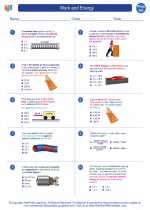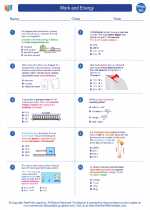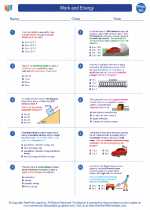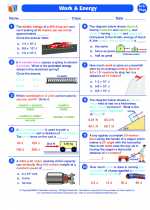Dynamics in Physics
Dynamics in physics is the branch of mechanics that deals with the study of forces and their effects on motion. It involves understanding how and why objects move the way they do, and the factors that influence their motion.
Key Concepts in Dynamics
- Force: A force is a push or pull acting on an object, which can cause it to accelerate, decelerate, or change direction.
- Mass: Mass is the amount of matter in an object, and it determines the object's resistance to changes in its motion.
- Newton's Laws of Motion: These laws describe the relationship between the motion of an object and the forces acting on it.
- First Law (Law of Inertia): An object at rest will remain at rest, and an object in motion will remain in motion with constant velocity, unless acted upon by a net external force.
- Second Law (Law of Acceleration): The acceleration of an object is directly proportional to the net force acting on it and inversely proportional to its mass (F=ma).
- Third Law (Action-Reaction): For every action, there is an equal and opposite reaction.
- Friction: Friction is the force that opposes the motion of objects in contact with each other. It can be static friction (at rest) or kinetic friction (in motion).
- Tension: Tension is the pulling force transmitted through a string, rope, cable, or other similar objects.
Study Guide
To understand dynamics in physics, it's important to grasp the following key points:
- Learn and understand Newton's Laws of Motion and how they apply to different scenarios.
- Practice solving problems involving forces, acceleration, and mass using the formula F=ma.
- Explore the concept of friction and its impact on the motion of objects.
- Understand how tension in ropes or strings affects the dynamics of systems involving pulleys, inclined planes, and other mechanical setups.
- Apply the principles of dynamics to real-world situations, such as the motion of vehicles, projectiles, and objects on inclined planes.
By mastering the concepts and principles of dynamics, you'll gain a deeper understanding of how forces influence the motion of objects, and be able to analyze and solve a wide range of physics problems related to dynamics.
[Dynamics] Related Worksheets and Study Guides:
.◂Physics Worksheets and Study Guides High School. Work and Energy
Worksheet/Answer key Work and Energy
Work and Energy  Worksheet/Answer key
Worksheet/Answer key Work and Energy
Work and Energy  Worksheet/Answer key
Worksheet/Answer key Work and Energy
Work and Energy  Worksheet/Answer key
Worksheet/Answer key Work and Energy
Work and Energy 

 Worksheet/Answer key
Worksheet/Answer key
 Worksheet/Answer key
Worksheet/Answer key
 Worksheet/Answer key
Worksheet/Answer key

The resources above cover the following skills:
PHYSICAL SCIENCE (NGSS)
Energy
Students who demonstrate understanding can:
Develop and use models to illustrate that energy at the macroscopic scale can be accounted for as either motions of particles or energy stored in fields.